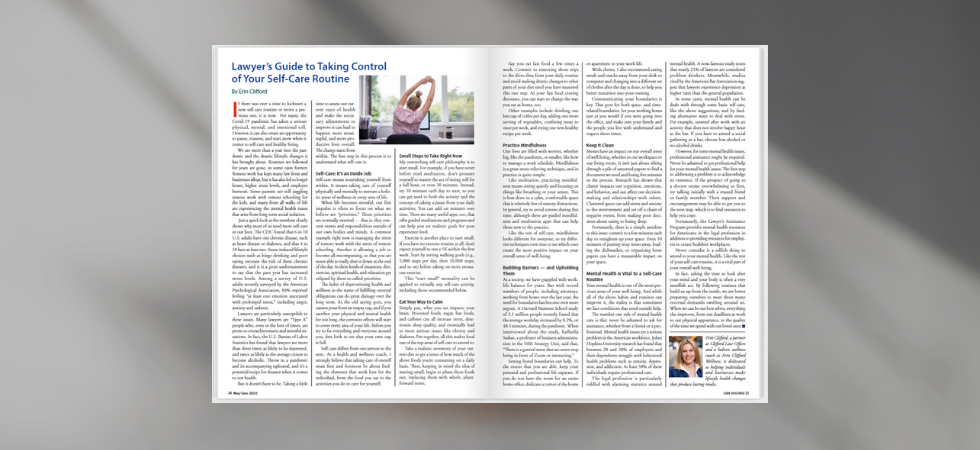Erin Clifford, Partner and Director of Marketing and Business Development at Clifford Law Offices, penned an article for lawyers in the Chicago Bar Association’s May/June edition of CBA Record magazine about the importance of self-care routines and how to take control of them. This topic is especially relevant in light of the last year where the pandemic dictated that many lawyers work remotely in addition to juggling new responsibilities like over-seeing remote school for children. Add social isolation to the equation and many people found themselves feeling overly stressed. In fact, Erin states in the article that in a recent survey of U.S. adults by the American Psychological Association, “84% reported feeling ‘at least one emotion associated with prolonged stress,’ including anger, anxiety and sadness” and that most lawyers – who are known to be “Type A” people – are “more than three times as likely to be depressed and twice as likely as the average citizen to become alcoholic” according to the U.S. Bureau of Labor Statistics.
Long-term stress – and/or other accompanying emotions related to it – can wreak havoc on people’s lives now and in the future, and can result in the development of chronic diseases and/or deterioration of mental health. The good news is that there are things that lawyers can do to lead a more meaningful, happier life, and, surprisingly, it comes from changing within through self-care.
You Cannot Pour from an Empty Cup
According to Erin, “self-care means nourishing yourself from within” by taking care of yourself physically and mentally. As the saying goes, you cannot pour from an empty cup, so making sure your cup is full – through self-care – is going to help you go the distance when it comes to taking care of others, such as clients, family and friends.
There is no one-size-fits-all routine for self-care. You must find what works best for you and incorporate them into your lifestyle. Here are tips from Erin on how to start ramping up your self-care routine.
Small Steps
To make a change to your current routine, take small steps. For example, if you want to start an exercise routine, start small. Give yourself a walking goal (start with 5,000 steps per day) and slowly up your step count. As you get into a walking routine, try adding in an exercise class one or two times per week. The concept of starting small can be applied to anything – whether it’s meditation, journaling, practicing gratitude, or eating more healthfully. By doing something gradually, the adjustment will be easier and will be more likely to “stick” and, thus, become a habit.
Eat Your Way to Calm
Erin states, “what you eat impacts your brain” and, as we know, it can also impact your waistline too. Take inventory of what you eat for two weeks by keeping a journal or using a free app like MyFitnessPal. After the two weeks is over, look at what you eat carefully. Processed foods, sugar, fast foods, and caffeine can all have a significant impact on your stress level and your sleep. Work to slowly eliminate or reduce certain items. For example, challenge yourself to drink one less cup of coffee per day or cut your drive-through visits in half during the week.
Build Barriers – and Uphold Them
If you are working remotely, set up an office or separate space dedicated as your work area. Abide by the same hours that you would in the office and make it clear to your family members or roommates that those are your business hours. Eat meals away from your “office” and, at the end of the day, log out of your email account and avoid checking email on your phone.
Keep it Clean
Another way to reduce stress is to keep your work space (and other areas in your house) clean and uncluttered. Make some time at the end of the day to de-clutter, sort through paperwork or load the dishwasher.
Mental Health is Vital
“Your mental health is one of the most precious areas of your well-being,” according to Erin. Do not be ashamed to ask for help – from a trusted friend, family member, or your medical practitioner – if you are not feeling okay. Sometimes mental health can be improved through self-care and other times it requires help from a professional. Either way, getting help is the best thing that you can do for your self-care.
Erin – who also is a holistic wellness coach – concludes the article by saying, “When we can be our best selves, everything else improves, from our deadlines at work to our physical appearance, to the quality of the time we spend with our loved ones.”
To read more details about the tips outlined above, click here to read Erin’s article.

